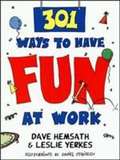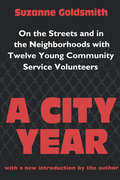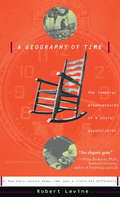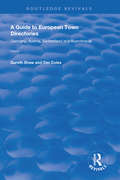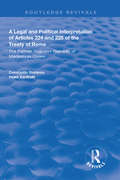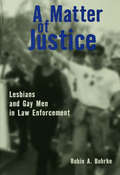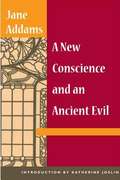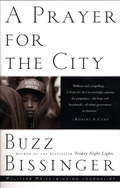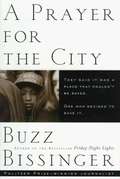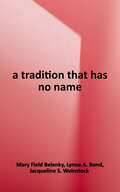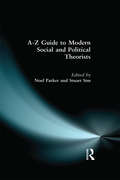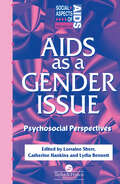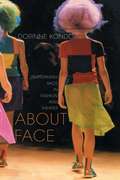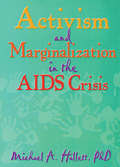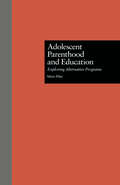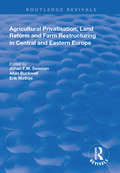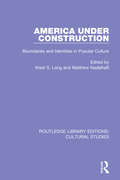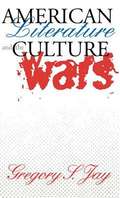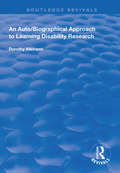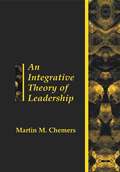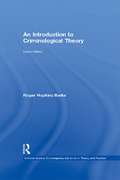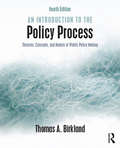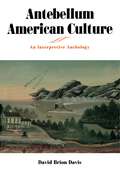- Table View
- List View
Youth in Foster Care: The Shortcomings of Child Protection Services (Children of Poverty)
by Bonita EvansFirst published in 1998. Routledge is an imprint of Taylor & Francis, an informa company.
301 Ways to Have Fun at Work
by Leslie Yerkes Hemsath Yerkes301 Ways to Have Fun at Work offers a complete resource anyone can use to create a dynamic workplace that encourages and inspires fun-and-games camaraderie among employees.
A City Year: On the Streets and in the Neighbourhoods with Twelve Young Community Volunteers
by Suzanne GoldsmithIn his inaugural address in 1993, President Clinton said: "I challenge a new generation of young Americans to a season of service to act on your idealism by helping troubled children, keeping company with those in need, reconnecting our torn communities." In the fall of 1990, Suzanne Goldsmith had signed on for her own "season of service" with City Year, the widely praised, Boston-based community service program frequently endorsed by political figures as a model for the nation. 'A City Year' is the story of Goldsmith's experience, an honest and gritty account of the triumphs and setbacks faced by an idealistic and experimental social program in its infancy. Together with a diverse team of young men and women--including a Burmese immigrant, a white prep-school graduate, a foster child, an ex-convict, and a black middle-class college student--Goldsmith helped renovate a building for the homeless, tutored school children, reclaimed a community garden from drug dealers, and organized a community street-cleaning day. The year Included backbreaking but gratifying work, the sense of family that comes from collaborative labor, and the potential strength of diversity. 'A City Year' is both the story of an uphill battle in urban America and an uplifting recipe for social change. As the AmeriCorps national service program dangles in the political wind on Capitol Hill, this book offers a true glimpse of what a "season of service" really means. It is a fascinating account for sociologists and all those with an interest in community service and youth.
A Geography Of Time: On Tempo, Culture, And The Pace Of Life
by Robert N. LevineIn this engaging and spirited book, eminent social psychologist Robert Levine asks us to explore a dimension of our experience that we take for granted--our perception of time. When we travel to a different country, or even a different city in the United States, we assume that a certain amount of cultural adjustment will be required, whether it’s getting used to new food or negotiating a foreign language, adapting to a different standard of living or another currency. In fact, what contributes most to our sense of disorientation is having to adapt to another culture’s sense of time. Levine, who has devoted his career to studying time and the pace of life, takes us on an enchanting tour of time through the ages and around the world. As he recounts his unique experiences with humor and deep insight, we travel with him to Brazil, where to be three hours late is perfectly acceptable, and to Japan, where he finds a sense of the long-term that is unheard of in the West. We visit communities in the United States and find that population size affects the pace of life--and even the pace of walking. We travel back in time to ancient Greece to examine early clocks and sundials, then move forward through the centuries to the beginnings of ”clock time” during the Industrial Revolution. We learn that there are places in the world today where people still live according to ”nature time,” the rhythm of the sun and the seasons, and ”event time,” the structuring of time around happenings(when you want to make a late appointment in Burundi, you say, ”I’ll see you when the cows come in”). Levine raises some fascinating questions. How do we use our time? Are we being ruled by the clock? What is this doing to our cities? To our relationships? To our own bodies and psyches? Are there decisions we have made without conscious choice? Alternative tempos we might prefer? Perhaps, Levine argues, our goal should be to try to live in a ”multitemporal” society, one in which we learn to move back and forth among nature time, event time, and clock time. In other words, each of us must chart our own geography of time. If we can do that, we will have achieved temporal prosperity.
A Guide to European Town Directories: Volume One - Germany, Austria, Switzerland and Scandinavia. (Routledge Revivals)
by Gareth Shaw Tim ColesFirst published in 1997, European Directories is a major resource guide for urban historians and historical geographers. It provides a detailed bibliography of all directories published and available in major libraries throughout Germany, Austria, Switzerland, Denmark and Scandinavia. In addition, the book provides an account of the evolution of town directories, as well as giving an analysis of directory reliability and coverage. Researchers will also find an extensive bibliography for each country of literature that has utilized directory information in historical studies. The second volume includes France and southern Europe. The whole provides the first European-wide resource for those undertaking urban historical studies.
A Legal and Political Interpretation of Articles 224 and 225 of the Treaty of Rome: The Former Yugoslav Republic of Macedonia Cases (Routledge Revivals)
by Helen Xanthaki Constantin StefanouFirst published in 1997. Article 224 is one of the most powerful Articles of the Treaty of Rome, allowing a member state to take unilateral measures and to suspend some or all its Treaty-based obligations in times of what can loosely be described as serious internal turmoil or external threat. It is for this reason that the very next Article of the Treaty, Article 225, allows the Commission or a member state to challenge invocation of Art.224, before the European Court of Justice (ECJ), on grounds of improper use. In practice, the use of Art.224, by a member state presents multiple problems. The obvious connection with defence and security issues has inhibited the ECJ which still has not given and authentic interpretation of this Article. As the recent former Yugoslav Republic of Macedonia (FYROM) cases (Greek referral for the embargo on FYROM) indicate, unless the use of Art.224 is blatantly flippant, the ECJ is not in a position to challenge a member state’s unilateral measures.
A Matter of Justice: Lesbians and Gay Men in Law Enforcement
by Robin BuhrkeAll too often, gays and lesbians are not accepted by the criminal justice community because of their sexual orientation, and because they are criminal justice personnel, they are not accepted by lesbians and gay men. Written by a past liaison between the Miami Beach Police Department and the lesbian, gay and bisexual community, A Matter of Justice
A New Conscience and an Ancient Evil
by Jane AddamsPublished in 1912 on the heels of Twenty Years at Hull-House and at the height of Jane Addams's popularity, A New Conscience and an Ancient Evil assesses the vulnerability of the rural and immigrant working-class girls who moved to Chicago and fell prey to the sexual bartering of what was known as the white slave trade. Addams offers lurid accounts--drawn from the records of Chicago's Juvenile Protection Association--of young women coerced into lives of prostitution by men who lurked outside hotels and sweatshops. Because they lacked funds for proper recreation, Addams argues, poor and socially marginalized women were susceptible to sexual slavery, and without radical social change they would perhaps be "almost as free" as young men. In addition to promoting higher wages and better living conditions, Addams suggests that a longer period of public education for young women would deter them from the dangers of city life. Despite its appeal to middle-class readers eager for tales of sexual excess and the rape of innocence, the press and prominent intellectuals criticized A New Conscience and an Ancient Evil for being disproportionately hysterical to its philosophical weight. Katherine Joslin's introduction considers the controversial reactions to the book and the circumstances of its publication. Behind the sensationalism of the narratives, Joslin locates themes including the commodification of sex and the importance of marriage for young women.
A Prayer for the City
by Buzz BissingerFrom the Pulitzer Prize-winning author of Friday Night Lights, the heart-wrenching and hilarious true story of an American city on its knees and a man who will do anything to save it.A Prayer for the City is acclaimed journalist Buzz Bissinger's true epic of Philadelphia mayor Ed Rendell, an utterly unique, unorthodox, and idiosyncratic leader willing to go to any length for the sake of his city: take unions head on, personally lobby President Clinton to save 10,000 defense jobs, or wrestle Smiley the Pig on Hot Dog Day—all the while bearing in mind the eternal fickleness of constituents whose favor may hinge on a missed garbage pick-up or an overzealous meter maid. It is also the story of citizens in crisis: a woman fighting ceaselessly to give her great-grandchildren a better life, a father of six who may lose his job at the Navy Shipyard, and a policy analyst whose experiences as a crime victim tempt her to abandon her job and ideals. "Fascinating, humane" (The New Yorker) and alive with detail and insight, A Prayer for the City describes the rare combination of political courage and optimism that may be the only hope for America's urban centers.
A Prayer for the City: The True Story of a Mayor and Five Heroes in a Race Against Time
by Buzz BissingerA Prayer for the City is Pulitzer Prize-winning journalist Buzz Bissinger's true epic of Philadelphia mayor Ed Rendell, an utterly unique, unorthodox, and idiosyncratic leader who will do anything to save his city: take unions head on, personally lobby President Clinton to save 10,000 defense jobs, or wrestle Smiley the Pig on Hot Dog Day--all the while bearing in mind the eternal fickleness of constituents whose favor may hinge on a missed garbage pick-up or an overzealous meter maid. It is also the story of citizens in crisis: a woman fighting ceaselessly to give her great-grandchildren a better life, a father of six who may lose his job at the Navy Shipyard, and a policy analyst whose experiences as a crime victim tempt her to abandon her job and ideals. Heart-wrenching and hilarious, alive with detail and insight, A Prayer for the City describes a city on its knees and the rare combination of political courage and optimism that may be the only hope for America's urban centers.
A Tradition That Has No Name: Nurturing the Development of People, Families, and Communities
by Jacqueline S. Weinstock Mary Field Belenky Lynne A. BondMary Field Belenky, Lynne A. Bond, and Jacqueline S. Weinstock hoping to carry Belenky's theoretical work in the bestselling Women's Ways of Knowing into the realm of everyday life, created the Listening Partners project, designed to help young women isolated in rural poverty give voice to their personal and communal needs and come together to create social change. A Tradition That Has No Name explores this project and the work of other women who have created organizations to give voice to and strengthen traditions of community organizing and leadership, particularly as they have developed in communities of women marginalized by race and class. Ranging across cultures and classes--from struggling inner-city neighborhoods to affluent middle-class suburbs, from African American communities in the South to poor rural communities in Vermont--the book teaches us how to appreciate the ways women create networks of listening and community-building, and how to bring these little-recognized traditions of women's activism to the forefront of public life. It is these "public homeplaces" women create together, the authors argue, that hold the key to empowering communities and creating social change.
A-Z Guide to Modern Social and Political Theorists
by Noel Parker Professor Stuart SimThe A-Z Guide to Modern Social and Political Theories is a companion volume to the already published A-Z Guide to Modern Literary and Cultural Theorists. It ranges widely through the social sciences and related areas to identify thinkers who have had a major impact on the development of modern social and political theory and given clear, accessible summaries of their work. While the accent is on the later twentieth century, several up-and-coming theorists are included to ensure a contemporary edge to the volume, classic names in the field from the earlier twentieth century are not neglected, and the collection also delves back into the nineteenth century for such founding figures of the social sciences as Marx and Comte. The volume is therefore both up-to-date and mindful of the sources of modern debates.
AIDS as a Gender Issue: Psychosocial Perspectives (Social Aspects of AIDS)
by Lydia Bennett Catherine Hankins Lorraine SherrThis international collection examines a wide range of psycho-social aspects of AIDS and HIV infection, including prevention, education, healthcare and policy in terms of gender challenges.
About Face: Performing Race in Fashion and Theater
by Dorinne KondoFrom the runways of Paris to the casting controversies over BMiss Saigon, from a local demonstration at the Claremont Colleges in California to the gender-blending of BM. Butterfly, BAbout Face examines representations of Asia and their reverberations in both Asia and Asian American lives. Japanese high fashion and Asian American theater become points of entry into the politics of pleasure, the performance of racial identities, and the possibility of political intervention in commodity capitalism. Based on Kondo's fieldwork, this interdisciplinary work brings together essays, interviews with designer Rei Kawakubo of Comme des Garcons and playwright David Henry Hwang, and "personal" vignettes in its exploration of counter-Orientalisms.
Activism and Marginalization in the AIDS Crisis
by Michael A HallettActivism and Marginalization in the AIDS Crisis shows readers how the advent of HIV-disease has brought into question the utility of certain forms of “activism” as they relate to understanding and fighting the social impacts of disease. This informative and powerful book is centrally concerned about the ways in which institutionally governed social constructions of HIV/AIDS affect policy and public images of the disease more so than activist efforts. It asserts that an accounting of the power institutional structures have over the dominant social constructions of HIV disease is fundamental to adequate forms of present and future AIDS activism. Chapters in Activism and Marginalization in the AIDS Crisis demonstrate how, despite what is thought of as the “successful activism” of the past decade, the claims of the HIV-positive are still being ignored, still being marginalized, and still being administratively “handled” and exploited even as the plight of those who find themselves HIV-positive worsens. Although chapters reject the assertion that activism has been a highly effective remedy to HIV-positive voicelessness, authors do not deny that activists have been vocal, but that they continue to be ignored despite their vocality.Contributors in Activism and Marginalization in the AIDS Crisis offer numerous examples of institutional control and demonstrate that institutional structures, and not activists, are controlling the public meaning of HIV-related issues. Readers learn how messages about HIV/AIDS are produced, negotiated, modified, and sustained through institutional mechanisms that serve mostly institutional interests rather than those of the HIV-positive. In gaining an understanding of these issues, readers will begin to learn how to modify and strengthen activist efforts with valuable insight on: the lack of HIV-positive voices in mainstream news portrayals of HIV/AIDS research on constructions of HIV-disease at the state government level social constructions and how they affect HIV/AIDS policy the political construction of AIDS and interest-based struggles the emergent “bio-politics” of HIV and homosexuality in the U.S. how institutional power works to govern public understanding of HIV diseaseInstitutional structures are defined in this book as groups engaged in and defined by the production of various “truths” which sustain them. Institutional power may be defined as the capacity to regulate, constrain, and disseminate versions of “truth.” Activism and Marginalization in the AIDS Crisis reveals how HIV activist groups have been outmaneuvered when it comes to the production and dissemination of various “truths” about HIV/AIDS by institutional structures more deeply steeped in social legitimacy and which have a superior capacity for message dissemination.HIV/AIDS activists, HIV-positive persons and those with AIDS, HIV/AIDS educators, public and institutional policymakers, health professionals, and the general public will find this book essential to understanding the social constructions of HIV/AIDS, how these affect HIV/AIDS-related policy and public opinion, and how to begin to cipher through the plethora of information to find and promote the “truth.”
Adolescent Parenthood and Education: Exploring Alternative Programs (MSU Series on Children, Youth and Families #2)
by Mary PilatFirst published in 1997. Routledge is an imprint of Taylor & Francis, an informa company.
Agricultural Privatization, Land Reform and Farm Restructuring in Central and Eastern Europe (Routledge Revivals)
by Johan F.M. Swinnen Allan Buckwell Erik MathijsFirst published in 1997 in the wake of the fall of the Soviet Union and its agricultural policies, these editors presented a series of ten related articles on the transition to post-communist, more privatised agricultural policies, each specialising in a specific region of Central and Eastern Europe. Resulting from a research network, this volume features a range of contributors, including those preparing PhDs, former governmental advisors and specialists in agricultural economics, food policy and statistics. The chapters cover Albania, Bulgaria, the Czech Republic, Eastern Germany, Hungary, Romania, Slovakia, Solvenia, and the Former Soviet Union, along with a comparative analysis. The contributors focus on three key issues of reform: the collection of detailed data, the collection of information on factors influencing the progress and completion of reform and explaining the results of privatisation and land reform, with a particular emphasis on the first two elements. This volume is well-suited to policy makers, analysists and researchers.
Alfred C. Kinsey: A Life
by James H. JonesThe hidden life of Alfred C. Kinsey, the principal architect of the sexual revolution. In this brilliant, groundbreaking biography, twenty years in the making, James H. Jones presents a moving and even shocking portrait of the man who pierced the veil of reticence surrounding human sexuality. Jones shows that the public image Alfred Kinsey cultivated of disinterested biologist was in fact a carefully crafted public persona. By any measure he was an extraordinary man--and a man with secrets. Drawing upon never before disclosed facts about Kinsey's childhood, Jones traces the roots of Kinsey's scholarly interest in human sexuality to his tortured upbringing. Between the sexual tensions of the culture and Kinsey's devoutly religious family, Jones depicts Kinsey emerging from childhood with psychological trauma but determined to rescue humanity from the emotional and sexual repression he had suffered. New facts about his marriage, family life, and relationships with students and colleagues enrich this portrait of the complicated, troubled man who transformed the state of public discourse on human sexuality.
America Under Construction: Boundaries and Identities in Popular Culture (Routledge Library Editions: Cultural Studies)
by Kristi S. Long Matthew NadelhaftA variety of theoretical approaches to the study of culture have emphasised the significance of the creation, maintenance, and the transgression of boundaries to identities – be they social, cultural, national or personal. The essays collected in this book, first published in 1997, explore the creation of identities in American culture through analysis of the boundaries within and across which American identity is negotiated. The dissemination of cultural identity and the creation of national identity through this process has had a crucial impact on the shape of social life in post-war American culture. The contributors to this volume offer a variety of perspectives on this richly complicated process.
American Literature and the Culture Wars
by Gregory S. JayIn this book the author states that he will be: "...questioning both the scope and the purpose of American literary studies. What ends do we pursue in the study and teaching of an "American" literature? Has the idea of a canon of great books reached the end of its usefulness? Where does American literature end and Mexican or Caribbean or Canadian or postcolonial literature begin? Is multiculturalism the end of civilization as we know it or the start of an overdue regeneration of our politics and pedagogy? How has the political economy of making ends meet in an era of downsizing and privatization affected academic freedom and the course of academic study? What happens in the classroom when we try to put an end to the conventional ways in which we have conceived and taught our subject? Playing off the pun in the title of this introduction, then, I want to explore this set of questions about the "ends" of American literary studies. This exploration includes rethinking our ends both in the nominal sense of "pragmatic intention" (goal, aim, objective, design, scheme) and in the verbal sense of "reaching a conclusion" (limit, terminate, cease, halt, expire). By focusing attention on these many ends and the controversial issues they involve, I hope in part to explain how this once arcane academic discipline ended up at the center of the culture wars."
An Auto/Biographical Approach to Learning Disability Research (Routledge Revivals)
by Dorothy AtkinsonFirst published in 1997 , Dorothy Atkinson collects testimonies of the personal perspectives of people with learning disability in order to rediscover the histories of people with learning disabilities. Calling on the importance if auto/biographical research as mode to encourage social, historical awareness and potential understanding of the commonalities as well the differences between people with learning difficulties.
An Integrative Theory of Leadership (Social Psychology Ser.)
by Martin ChemersA definition of leadership that would be widely accepted by the majority of theorists and researchers might say that "leadership is a process of social influence in which one person is able to enlist the aid and support of others in the accomplishment of a common task." The major points of this definition are that leadership is a group activity, is based on social influence, and revolves around a common task. While this specification seems relatively simple, the reality of leadership is very complex. Intrapersonal factors (thoughts and emotions) interact with interpersonal processes (attraction, communication, and influence) to have effects on a dynamic external environment. Each of these aspects brings complexity to the leadership process. It is the purpose of this book to make that complexity a bit more manageable, increasing the ability to understand what effective leadership is. This volume offers a comprehensive analysis and integration of the empirical research literature and major theories of leadership. It employs a functional analysis stressing what leaders must do to be effective and specifies the processes related to each function. The chapters provide an extensive review of the major approaches to leadership. Each chapter is discussed with an eye to explaining the basic principles, the research evidence, and where appropriate, the relationship of the theory or research program to other theories. In addition, this volume offers the most comprehensive treatment of cultural and gender factors in leadership of any recent book. The question of male-female differences in leadership style and performance is carefully analyzed against the empirical findings. The ultimate goal of this review of the literature is to provide a basis for the presentation of an integrative model of leadership that brings together function and process and provides an armature for integrating what is known.
An Introduction to Criminological Theory (Criminal Justice: Contemporary Literature in Theory and Practice)
by Roger Hopkins BurkeFirst Published in 1997. Routledge is an imprint of Taylor & Francis, an informa company.
An Introduction to the Policy Process
by Thomas A BirklandThe fourth edition of this widely-used text relates theory to practice in the public policy process. In a clear, conversational style, author Tom Birkland conveys the best current thinking on the policy process with an emphasis on accessibility and synthesis. This new edition has been reorganized to better explain the role of policy analysis in the policy process. New to this edition: * A new section on the role of policy analysis and policy analysts in the policy process. * A revised and updated chapter surveying the social, economic, and demographic trends that are transforming the policy environment. * Fully updated references to help the advanced reader locate the most important theoretical literature in policy process studies. * New illustrations and an improved layout to clarify key ideas and stimulate classroom discussion. The book makes generous use of visual aids and examples that link policy theory to the concrete experience of practitioners. It includes chapter-at-a-glance outlines, definitions of key terms, provocative review questions, recommended reading, and online materials for professors and students.
Antebellum American Culture: An Interpretive Anthology
by David Brion DavisFirst published in 1979, this volume offers students and teachers a unique view of American history prior to the Civil War. Distinguished historian David Brion Davis has chosen a diverse array of primary sources that show the actual concerns, hopes, fears, and understandings of ordinary antebellum Americans. He places these sources within a clear interpretive narrative that brings the documents to life and highlights themes that social and cultural historians have brought to our attention in recent years. Beginning with the family and the issue of socialization and influence, the units move on to struggles over access to wealth and power; the plight of "outsiders" in an "open" society; and ideals of progress, perfection, and mission. The reader of this volume hears a great diversity of voices but also grasps the unities that survived even the Civil War.

